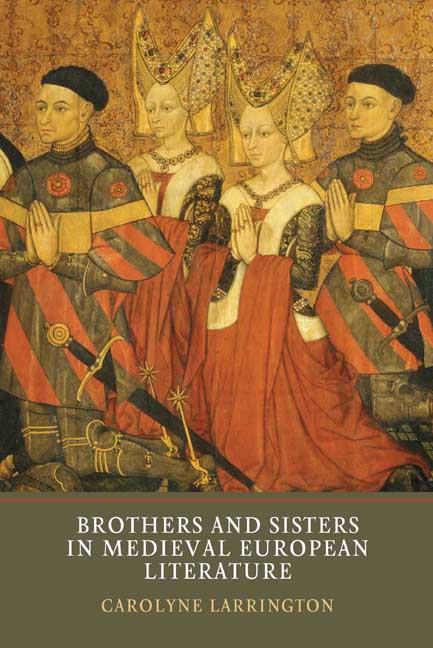Book contents
- Frontmatter
- Dedication
- Contents
- Acknowledgements
- Abbreviations
- Introduction
- 1 The Medieval Sibling in History
- 2 ‘Berr er hverr á bakinu nema sér bróður eigi’: Fraternal Love and Loyalty
- 3 ‘Io v’ho cara quanto sorella si dee avere’: Sisters, and their Brothers
- 4 ‘Næs þæt andæges nið’: Fraternal Hatreds
- 5 ‘Te souviegne de ce que je suis ta seur’: Sisters and Hostility
- 6 ‘The king’s dochter gaes wi child to her brither’: Sibling Incest
- 7 ‘So wil ich dir ce wibe mine swester gebn’: When Siblings Marry
- 8 ‘Trewethes togider that gun plight’: Fictive Siblings
- Conclusion
- Bibliography
- Index
8 - ‘Trewethes togider that gun plight’: Fictive Siblings
Published online by Cambridge University Press: 08 May 2021
- Frontmatter
- Dedication
- Contents
- Acknowledgements
- Abbreviations
- Introduction
- 1 The Medieval Sibling in History
- 2 ‘Berr er hverr á bakinu nema sér bróður eigi’: Fraternal Love and Loyalty
- 3 ‘Io v’ho cara quanto sorella si dee avere’: Sisters, and their Brothers
- 4 ‘Næs þæt andæges nið’: Fraternal Hatreds
- 5 ‘Te souviegne de ce que je suis ta seur’: Sisters and Hostility
- 6 ‘The king’s dochter gaes wi child to her brither’: Sibling Incest
- 7 ‘So wil ich dir ce wibe mine swester gebn’: When Siblings Marry
- 8 ‘Trewethes togider that gun plight’: Fictive Siblings
- Conclusion
- Bibliography
- Index
Summary
Introduction
Brothers’ quest for differentiation leads them to carve out different roles within the family structure and, as chapter two argued, they often thrive best when keeping each other at arm's length. Although brothers-in-law are chosen, rather than acquired by accident of blood, strategic considerations often operate to bring a socially acceptable but not necessarily emotionally congenial affine into the sibling cohort. Nevertheless, although ‘the sibling self is the social self’, as Juliet Mitchell avers, a friend differs from a brother in crucial ways. In romance especially, when the young man sets out into the world he frequently looks for someone who is like him, but who is not involved in the complex rivalries of the sibling group. Thus he often chooses for himself a kind of double, a sworn-brother who functions as a second self. Driven by an ‘urge towards similitude … the impulse to pattern the self on the other, and thus generalize “sameness” at the expense of “difference’”, as Sarah Kay observes, released from the sibling pressure to differentiate himself from a brother and from the competition for parental affection and inheritance, the young man seeks someone who is just like him. Unlike the twins discussed in chapters two and three, such fictive brothers are often physically similar, even identical to one another. Their external resemblance figures an inner similitude which demands that the men spend their lives together, while, on the level of plot, it frequently facilitates the substitution of one fictive brother for the other.
The most important model for male friendship available to medieval authors was the Ciceronian ideal of amicitia, dominant in monastic and intellectual contexts. Cicero insisted that, ‘nisi in bonis amicitiam esse non posse’ (‘friendship cannot exist except among good men’), and that the highest form of friendship, closely allied to virtue, was not driven by hopes of advantage, but by natural inclination: ‘a natura … potius quam ab indigentia orta amicitia’ (‘friendship springs rather from nature than from need’). Friendship is thus, inevitably, predicated on similarities: ‘Verum enim amicum qui intuetur, tamquam exemplar aliquod intuetur sui’ (‘Again, he who looks upon a true friend, looks, as it were, upon a sort of image of himself’).
- Type
- Chapter
- Information
- Brothers and Sisters in Medieval European Literature , pp. 208 - 234Publisher: Boydell & BrewerPrint publication year: 2015



